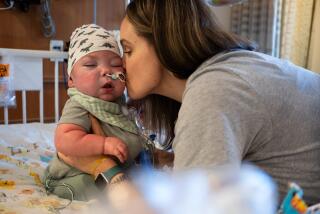Welfare Reform Malady
Under welfare reform, those on welfare must go to work after five years. One in five recipients is exempted from those time limits for “good cause,” such as poor health of the mother or a child.
A new national study now suggests that for every mother excused for poor health, twice as many suffer from debilitating physical and mental ailments or are raising children who are so sick that their parents cannot possibly keep a job.
Juggling a sick child with work is not a new challenge. What is notable from the report released Wednesday by the respected Manpower Demonstration Research Corp. is the scope of this problem.
More than 40% of welfare recipients surveyed in Los Angeles, Miami, Cleveland and Philadelphia had multiple health problems, according to the research, or children with severe disorders, such as cancer, cardiac ailments, HIV, seizure disorders, severe retardation or mental illness. Those problems were often compounded by other barriers to getting and holding down a job, such as little education, no work experience, limited English skills and having a large number of children. This information, based on a study of 4,000 single women who depended on welfare and lived in very poor neighborhoods in 1995, should influence how Congress adjusts the welfare reform law when it comes up for reauthorization next year.
Washington could increase exemptions or consider new regulations patterned after the Family Leave Act, which allows a worker to take time off from work without losing a job to care for a sick child or parent. In the case of the welfare mother who is sick or is caring for a sick child, the clock could be stopped temporarily, before she runs out of time on welfare.
The survey conducted in 1998 and 1999 also found that women who get off welfare and go to work must sometimes do without health insurance. They get sick and don’t even attempt to go to the doctor because of the cost.
Washington attempted to address this consequence of welfare reform by requiring states to provide health coverage to poor families. Congress also hugely expanded the Children’s Health Insurance Program, which allocates matching funds to allow states to provide health coverage for uninsured youngsters, but not all of that money was spent even in a state like California, with its huge population of more than a million uninsured children.
That so many former welfare recipients and their children continue to lack health benefits suggests that California still must do a better job in getting the word out about the state’s Medi-Cal and Healthy Families programs. The state’s new internet application should help parents avoid the hassle of having to go one place to enroll young children and another for older children.
California needs to create one seamless public health insurance program to provide a medical safety net for children who most need it.
More to Read
Sign up for Essential California
The most important California stories and recommendations in your inbox every morning.
You may occasionally receive promotional content from the Los Angeles Times.










